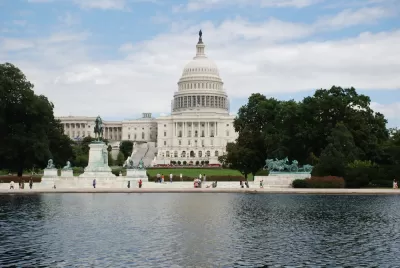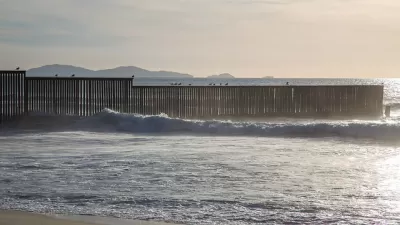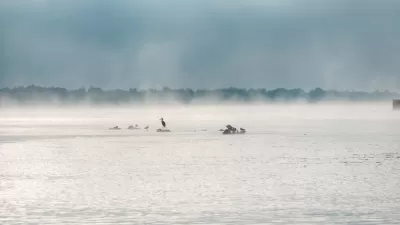A House of Representatives committee has different ideas about the spending priorities of the federal government when it comes to issues like a proposed border wall and the Great Lakes.

News of action from the House Appropriations Committee this week moved forward budgetary considerations for two important infrastructure and environmental spending programs—both with key differences from the ambitions expressed by the very speculative "America First: A Budget Blueprint to Make America Great Again" proposal released by the Trump Administration in May 2017.
First, the "U.S. House Appropriations Committee released legislation today fully funding a Great Lakes restoration program, rejecting a proposal from President Donald Trump to eliminate the $300 million committed each year to the effort," reports Todd Spangler for Detroit Free Press. The legislation is the 2018 Interior and Environment Appropriations bill and it also "restores much of the $2.4 billion proposed to be cut from the budget of the U.S. Environmental Protection Agency, which had been targeted for a reduction of nearly a third."
Meanwhile, Andrew Taylor reports for the Associated Press that the same committee also released its $44 billion homeland security funding bill on the same day, including $1.6 billion in funding for a proposed wall along the U.S-Mexico border. That bill means Mexico will not be paying for the wall, as President Trump promised many times during the 2016 presidential election.
As noted by Spangler, the 2018 Interior and Environment Appropriations bill is "one of several that would fund government for the fiscal year beginning Oct. 1," and it "still has to be voted on in committee and passed by the full chamber before being considered in the Senate." For the purposes of the Great Lakes Restoration Initiative, at least, that is good news for its chances of survival.
FULL STORY: $300 million for Great Lakes protected in funding bill, thwarting Trump

Alabama: Trump Terminates Settlements for Black Communities Harmed By Raw Sewage
Trump deemed the landmark civil rights agreement “illegal DEI and environmental justice policy.”

Planetizen Federal Action Tracker
A weekly monitor of how Trump’s orders and actions are impacting planners and planning in America.

The 120 Year Old Tiny Home Villages That Sheltered San Francisco’s Earthquake Refugees
More than a century ago, San Francisco mobilized to house thousands of residents displaced by the 1906 earthquake. Could their strategy offer a model for the present?

In Both Crashes and Crime, Public Transportation is Far Safer than Driving
Contrary to popular assumptions, public transportation has far lower crash and crime rates than automobile travel. For safer communities, improve and encourage transit travel.

Report: Zoning Reforms Should Complement Nashville’s Ambitious Transit Plan
Without reform, restrictive zoning codes will limit the impact of the city’s planned transit expansion and could exclude some of the residents who depend on transit the most.

Judge Orders Release of Frozen IRA, IIJA Funding
The decision is a victory for environmental groups who charged that freezing funds for critical infrastructure and disaster response programs caused “real and irreparable harm” to communities.
Urban Design for Planners 1: Software Tools
This six-course series explores essential urban design concepts using open source software and equips planners with the tools they need to participate fully in the urban design process.
Planning for Universal Design
Learn the tools for implementing Universal Design in planning regulations.
Clanton & Associates, Inc.
Jessamine County Fiscal Court
Institute for Housing and Urban Development Studies (IHS)
City of Grandview
Harvard GSD Executive Education
Toledo-Lucas County Plan Commissions
Salt Lake City
NYU Wagner Graduate School of Public Service





























